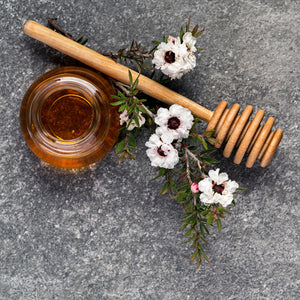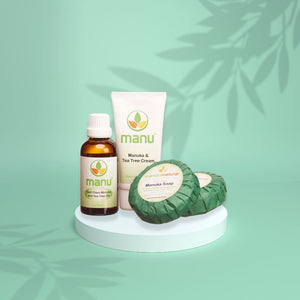
How and Where to use Antibiotic Propolis
4 health zones where you can use NZ PROPOLIS to become unattractive to bacteria
Why is propolis NZ so miraculous and acts as a natural antibiotic? What is the healing effect of propolis NZ, and how does it help us with various diseases and conditions?
Today, when most microorganisms have acquired resistance to synthetic antibiotics due to excessive use, it is necessary to find wiser solutions offered by nature.
Research confirms that there are many products with antibiotic action in nature. Propolis is one of them.
Propolis is the common name for a mixture of resinous substances that bees collect from the flowers of various plants.
Bees collect it and mix it with the secretion of the jaw glands, enzymatically modifying it so that the most critical components, flavonoids, become active.
The main function of propolis in beehives is to control temperature, light, and humidity. Furthermore, it shields hives from pathogens and some colony invaders.
All parts of the hive are disinfected with propolis, so the inside of the hive is sterile. Bees are very clean and meticulous creatures. They will never deposit nectar or multiply in hives and honeycombs that are not coated with propolis.
Propolis has a specific appearance, a unique bitter taste, and a characteristic aromatic scent. The composition and color depend on the plant species from which the bees collect material.
Traditionally, propolis has been used for over 2000 years. It was an essential and esteemed product in the medicine of the Egyptians, Babylonians, Arabs, Greeks, Romans, and many other ancient peoples.
But, every one of them was different!
What is New Zealand propolis, and why would you favor that one?
As I mentioned earlier, propolis is a mixture of resinous substances that bees collect from the flowers of various plants.
The potency and strength of the propolis you bought last time depends solely on its origin location.
New Zealand propolis is a “European” type propolis, however…
New Zealand is the most geographically isolated biosystem in the world.
82% of New Zealand plants are endemic – they are not found anywhere else in the world.
This distinctive biozone gives its flora unique properties. Researchers discovered that many rare species had developed unique characteristics to survive.
These characteristics provide plants like Leptospermum Scoparium (manuka shrub).
Chemical composition of propolis
Propolis contains more than 300 different components, 50% resin, 30% wax, 10% essential oils, 5% pollen, numerous vitamins and minerals, organic acids, polyphenols, flavonoids.
Natural healing properties are due to vitamins, mineral salts, microelements, and essential oils.
However, flavonoids have the most potent healing properties. Numerous flavonoids are present in propolis: galanin, quercetin, chrysin, kaempferol, apigenin, pinocembrin, and pinobanxin.
What does propolis NZ help with?
Propolis has long been used to treat and prevent many diseases.
It is rightly called a “natural antibiotic.” This is because it has strong antibiotic, disinfectant, analgesic, and immunostimulatory effects.
1. ORAL HEALTH – SORE THROAT, GUM INFECTION, CAVITY PREVENTION
It significantly improves oral health, has an anti-inflammatory effect, relieves toothache and damage to the mucous membranes of the oral cavity. Propolis is also ideal as an alternative but natural therapy in the fight against oral infections.
Propolis is excellent in wound healing. Pinocembrin is a flavonoid that has a special antifungal effect. These anti-inflammatory and antimicrobial properties make propolis NZ extremely useful in wound healing, not only in the mouth but also in other parts of the body.
It is important to note that propolis, in addition to alleviating the symptoms of gum disease, also serves as a preventive measure to protect against bacteria found in dental plaque that cause tooth decay.
Propolis prevents and stops the growth of bacteria in the mouth, thus increasing the strength of tooth enamel and strengthening the gum.
Research has also been conducted on patients suffering from periodontitis. The results showed that using an aqueous solution with propolis extract reduces bleeding gums.
Namely, when used on the so-called periodontal pockets, it prevents the action of bacteria that fight the body’s defense system.
Also, propolis systematically fends off a further bone loss in periodontal disease.
2. IMMUNE & RESPIRATORY HEALTH – VIRAL, BACTERIAL OR FUNGAL INFECTIONS
Propolis has a positive effect on respiratory health. In addition, it has a very pronounced antimicrobial and antiviral effect. Thanks to its ingredients, it stimulates natural immunity and provides maximum organism protection in risky periods.
Prolonged use raises immunity and strengthens the body’s defenses, and it has been scientifically proven to act synergistically with some antibiotics.
By eliminating most microorganisms entering our body through the oral cavity, propolis NZ reduces the possibility and intensity of various viral and other types.
The lower the intensity of the common cold, the lower the problems for people with bronchitis or asthma.
Please note that propolis can cause allergies in a small number of people. And since there are various allergies, even to water, it is never known how someone may react, especially in the case of people whose immunity is impaired.
3. DIGESTIVE HEALTH – STOMACH ULCERS, GASTRITIS
Research has shown that propolis is safer than antibiotics because it does not create resistance, is not harmful to health, does not disturb intestinal flora, and does not kill the good bacteria that the body needs.
The literature described the first evidence about the beneficial role of propolis on experimental Ulcerative Colitis in 1979.
Propolis treatment effectively faded UC by mechanisms associated with decreased oxidative stress and inflammation. These are critical parameters in the pathogenesis of the disease. One of its mechanisms is that propolis can reduce bacterial translocation (spreading).
Similarly, the flavonoid quercetin, another compound found in propolis, helps control one protein complex called NF-κB signaling pathway.
This ancient protein links pathogenic signals and cellular danger signals, thus organizing cellular resistance to invading pathogens. (1)
Handy! Right?
4. HEALTHY SKIN – TOPICALLY FOR ACNE, SHINGLES, SKIN INFECTIONS
Propolis tincture has a proven effect on several skin diseases. For example, it helps people suffering from dermatitis, blisters, and eczema. At the same time, it relieves pain during various skin injuries and helps wounds to heal faster.
In addition, propolis may alleviate staphylococcal infections and fungal nail diseases.
Propolis contains antioxidants such as galanin, pinobanskin, quercetin, caffeic acid, and hydroquinone.
These compounds can often be found in pimples and skincare creams. Tincture also contains vitamins: magnesium, zinc, iron, nickel, but also many vitamins necessary for the health and beauty of the face. (2)
When we combine all these ingredients, we get a potent mixture that directly acts on pimples and acne and helps us remove them from the face and restore radiance.
In addition, propolis is fantastic in treating pimple scars.
Of course, the face must first be clean and without makeup. I advise that in the process of treating acne and pimples, you remove makeup on the side and leave the skin to breathe to regenerate more efficiently.
Synergistic effects of honey and propolis tincture toward drug multi-resistant Staphylococcus Aureus, Escherichia Coli and Candida Albicans
The mechanism of propolis’s antimicrobial activity is complex and might be attributed to the synergistic action between its various potent biological ingredients such as phenolics and flavonoids.
Scientists also found that honey and propolis affect the cytoplasmic membrane, inhibiting bacterial motility, enzyme activity, cell division, and protein synthesis.
In like manner, Galagin and caffeic acid derived from propolis are enzymatic inhibition agents in bacteria.
Propolis has many biological activities, including antimicrobial, antioxidant, anti-inflammatory, anesthetic, and anticancer properties.
In high concentration, it has bactericidal activity. However, few studies have been published regarding its effects against multi-resistant pathogens.
Nevertheless, it was found that manuka honey and propolis can inhibit Fluconazole-resistant Candida glabrata. This bacteria can affect the urogenital tract and not even Fluconazole which is an antifungal medication used for a number of infections can not help.
Other studies showed that ethanol extract of propolis inhibits drug multi-resistant bacteria, MRSA, Enterococcus spp., and Pseudomonas aeruginosa.
Is propolis NZ hope for “solving” antibiotic resistance?
We are safe from antibiotic-resistant bacteria with propolis, manuka honey, and many other natural products.
You see, propolis disrupts the synthesis of proteins, folic acid, and transpeptidase so that bacteria can no longer multiply.
Also, propolis inhibits the metabolic processes of pathogens by disrupting cellular organelles and components responsible for energy production. (3)
Propolis tincture works against viruses, fungi and is a powerful antioxidant. In addition, it does not allow fungi and viruses to multiply, thus preventing disease.
Numerous studies of propolis have proven that the antibacterial effect is more pronounced on gram-positive bacteria (streptococcus, staphylococcus) than on gram-negative microbes (Salmonella, Escherichia coli, Proteus spp, Pseudomonas aeruginosa).
In the case when it does not directly affect gram-negative bacteria, propolis creates protection in the body against the inflammation they cause. Its effect is weaker than antibiotics, but it is less toxic, does not cause resistance, and does not damage the normal intestinal microflora.
The ‘intent’ of an antibiotic is to kill everything to get rid of you from symptoms.
But the trick is to make your “bullet” as specific as possible to interact with the biology of a bacterium. The more specific interaction is, the easier it is for evolution to avoid it since usually, it requires only a few changes to the genome.
This is necessary because, in terms of evolution, bacteria bypasses us. They are dividing between 1-50 times a day; however, there are >1025 of them, so that’s a lot of variations.
So, if we can’t beat them at their own game, we just have to be smarter.
Propolis tincture from Manuka Natural
Compared to other preparations, the advantage of propolis NZ from Manuka Natural is that it is made with 2160mg of PURE propolis.
Propolis tincture from New Zealand has exceptionally high levels of important bioactive components; bioflavonoids, phenolic acids, and esters, including CAPE (Caffeic Acid Phenethyl Ester).
It is harmless to the body, and you can use it in combination with drugs or alone.
You can even use it to relieve the effects of Lyme disease.
Apply propolis tincture NZ directly to the affected area or mix 4 drops with water to gargle up as needed.
In the end …
As we age, the body’s immune response to various diseases and pathogens becomes less potent, and the body’s resistance weakens. Therefore, to preserve a strong, healthy, and vital organism, use propolis in the most accessible forms.
What is crucial is to buy propolis from proven manufacturers with a declaration and guarantee of quality and origin.
If you want to have a preventive effect on your health and strengthen your body, propolis for immunity has proven its effectiveness many times in practice.
If you prefer a different, more straightforward form of propolis, on our website, you can also find propolis in capsule forms. They are powdered propolis in a capsule and do not contain alcohol.
ORIGINALLY PUBLISHED on blog.manukanatural.com



Leave a comment